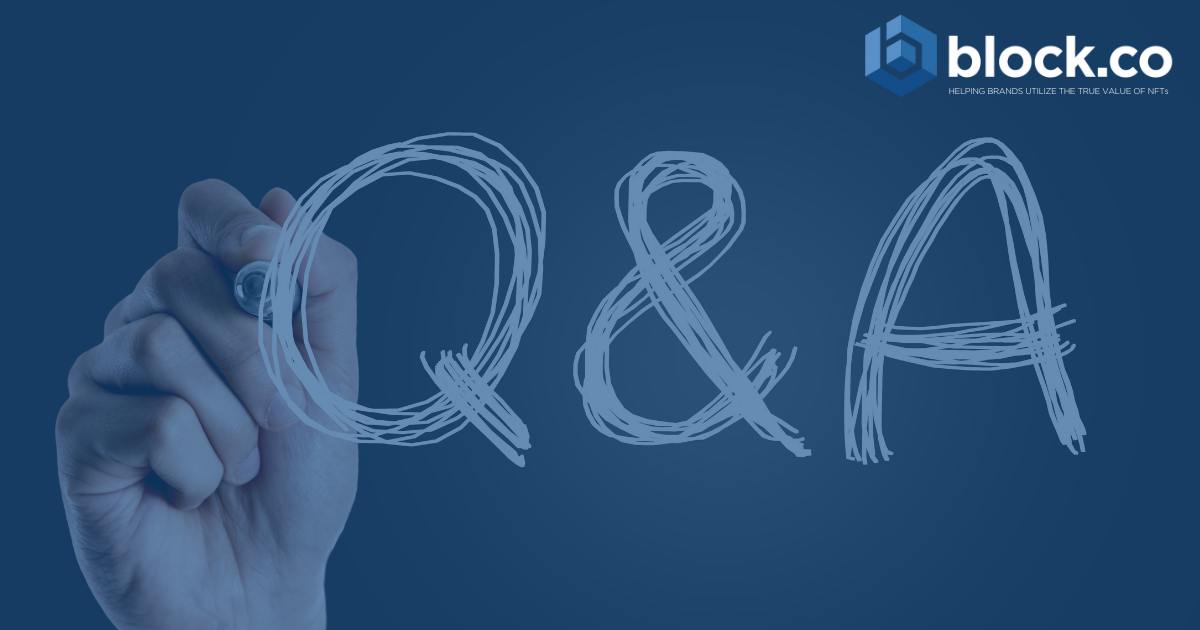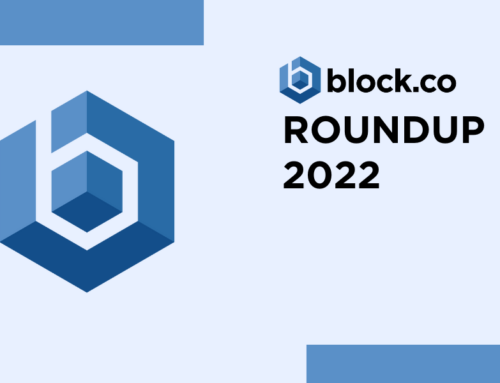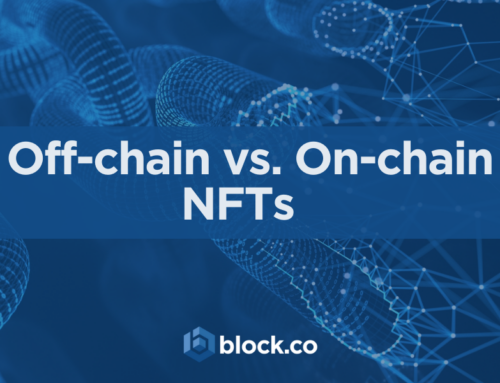Blockchain in the Public Sector — Webcast Q&A

Block.co’s fourth webcast titled “Digital Transformation of the Public Sector & The Upcoming Legislation of Blockchain Technology in Cyprus” was an immense success. We gathered some of the best experts in the field, Deputy Minister Kyriacos Kokkinos, Jeff Bandman, Steve Tendon, and Christiana Aristidou to share their experience and discuss with us the latest updates regarding Blockchain in the Public Sector.
In its fourth series of webcasts, Block.co gathered 281 people watching the event from 41 different countries, for a two-hour webcast where guests answered participants’ questions. Following the impressive outcome and response we received from the audience, Block.co’s team has done its best to address all the questions for which public information is available.
Below is a list of the questions that were made and were not answered due to time constraints during the webcast. For the remaining questions from our audience, the team will reach out to our distinguished guests to receive their comments and feedback. Please note, that the below information is only for informational purposes!
Question 1:
How can asset tracing be accomplished with bitcoins and cryptocurrency? And how can this be regulated?
Block.co Team Answer:
Digital Asset tracing may be accomplished with cryptocurrency intelligence solutions such as Cipher Trace and the ICE cryptocurrency intelligence program. FATF (Financial Action Task Force) embarked on a program of work from summer 2018 to June 2019 to strengthen and update the provisions dealing with virtual assets and virtual asset service providers. FATF updated Recommendations in October 2018 and Guidance in June 2019 include several new obligations that apply to VASPs. The so–called “Travel Rule” FATF announced in October 2019 agreed on the assessment criteria for how it will assess countries’ compliance with the new global standards. Under the Travel Rule, the transmitter’s financial institutions must include and send information in the transmittal order such as Information about the identity, name, address, and account number of the sender and its financial institution Information about the identity, name, address and account number of the recipient. The “Travel Rule” is effectively being applied to cryptoasset transfers when there is a virtual asset service provider (VASP) involved. The scope of focus has broadened from “convertible” virtual assets to any virtual asset. Countries should make sure businesses can freeze crypto wallet or exchange accounts for sanctioned individuals.
Question 2:
Which kind of software or technical knowledge is required to develop cryptocurrency?
Block.co Team Answer:
It depends on the type of cryptocurrency you wish to create, as well as the preferred functionality and features, and characteristics of the token or coin (i.e. will it be pre-mined, what type of hashing or cryptographic algorithm will be used (i.e. proof of work (POW) or proof of stake (POS) or a hybrid of both), etc. Likewise, it is useful to utilize a programming language that is broadly used and supported by a vast and active development community; more data could be found here: more information could be found here: top programming languages in 2015/2016, published by IEEE here, and TIOBE. Hypothetically, you can utilize any programming language to make cryptocurrency digital money, however, the most widely recognized are C, C++, Java, Python, Perl. The beauty of cryptocurrencies is that you can literally have access to the entire Bitcoin and Ethereum open-source programming scripts, and create your alternate coin (altcoin).
Question 3:
Hello all, I want to know about the current status of the European Union Blockchain initiative in currency or public identity.
Block.co Team Answer:
Please refer to the European Services Blockchain Infrastructure (EBSI) website.
Question 4:
Mining is also the process of confirmation of transactions in the Bitcoin Blockchain. What is the process of confirmation of transactions in the Blockchain of an Organization? How do we call it?
Block.co Team Answer:
That would depend on the specific consensus algorithm used for the confirmation of transactions. The consensus algorithm is part of the blockchain protocol that defines the rules on how consensus is reached on that blockchain. In order to participate, entities on the blockchain must obey and follow the same consensus algorithm. Make sure to check our glossary for more information.
Question 5:
How does a small business implement blockchain into its current non-blockchain software systems? Who do they hire to install it?
Block.co Team Answer:
It is easy when there are APIs to connect the various software. For more information, you can check Block.co API.
Question 6:
What is your opinion on digitizing developing economies like India by using AI and blockchain?
Block.co Team Answer:
Watch a very interesting webinar on the matter by Mr. Prasanna:
Question 7:
Blockchain technologies have been around since 2008. What would you say has been the biggest obstacle in widespread adoption?
Block.co Team Answer:
In our opinion, the biggest obstacles are volatile cryptoasset prices, complicated UIs, undefined blockchain technology standards. Moreover, the legislation around the technologies is still now being developed and does not offer legal certainty for broader adoption.
Question 8:
Limitations to Blockchain Usability in the Public Sector?
Block.co Team Answer:
Blockchain in the Public Sector, like any other innovative concept with big potential, cannot be a solution to every problem. Users and developers are still figuring out technological and managerial challenges. From a technological perspective, some aspects such as platform scalability, validation methods, data standardization, and systems integration must still be addressed. From a managerial point of view, the questions include business model transformation, incentive structure, and transaction scale, and maturity. Read more here.
Question 9:
How can these blockchain initiatives be practical for the African context
Block.co Team Answer:
As long as the internet infrastructure is in place, these blockchain initiatives may have the same benefits for the African region.
Question 10:
What are some compelling use cases you’ve seen lately, and how do they serve to further legitimize blockchain as a solution?
Block.co Team Answer:
You can see the global trends from all around the world when it comes to further legitimization as a solution, with China leading the way. Read more here.
Question 11:
How does digital currency manage the issue of money laundering?
Block.co Team Answer:
Depends under which context you are looking at the term digital currency. Digital currency usually refers to a balance or a record stored in a distributed database, in an electronic computer database, within digital files or a stored-value card. Some examples of digital currencies are: cryptocurrencies, virtual currencies, central bank digital currencies (CBDCs) and e-Cash. The Financial Action Task Force (FATF) is an intergovernmental body established in 1989 on the initiative of the G7 to develop policies to fight money laundering. Since 2001 FATF is also looking into terrorism financing. The objectives of FATF are to set standards and promote effective implementation of legal, regulatory and operational measures for combating money laundering, terrorist financing and other related threats to the integrity of the international financial system. FATF is a “policy-making body” that works to generate the necessary political will to bring about national legislative and regulatory reforms in these areas. FATF monitors progress in implementing its Recommendations through “peer reviews” (“mutual evaluations”) of member countries. It is the global watchdog for anti-money laundering & counter–terrorist finance. In June 2019, it updated its guidance paper for Virtual Assets Service Providers (VASPs) regarding the transfer of digital assets. There was an insertion of a new interpretive note that sets out the application of the FATF Standards to virtual asset activities and service providers. To apply FATF Recommendations, countries should consider virtual assets as “property,” “proceeds,” “funds,” “funds or other assets,” or other “corresponding value.” Countries should apply the relevant measures under the FATF Recommendations to virtual assets and virtual asset service providers (VASPs). Read more about the FATF recommendations here.
Question 12:
To what extent can blockchain be used to improve the privacy of healthcare?
Block.co team Answer:
Please refer to our previous webcast, blog, and articles for more information.
Question 13:
What is Blockchain technology in Shipping?
Block.co team Answer:
The shipping sector has been in the hold of phony maritime institutes charging exorbitant fees via agents, issuing certificates to candidates who do not have the imperative attendance, or those candidates who just pay the fees for the course and ask for the certificate. In view of these fake accreditations, the possibility exists that someone could be harmed or killed, and we could face any number of potential ecological disasters. Having the option to easily verify the genuine origin of a certificate by an approved maritime center is foremost for shipping companies to fast-track their operation and streamline their labor.
Question 14:
Different uses of blockchain other than cryptocurrency?
Block.co team Answer:
Please refer to our blog and glossary.
Question 15:
Upcoming trends in Blockchain concerning Advertising, Marketing, and Public Relations in the Public and Private sectors.
Block.co Team Answer:
Regarding the application of blockchain technology to media copyrights, please see Block.co use case proposal during the Bloomen Ideathon.
Question 16:
How to create a decentralized blockchain?
Block.co Team Answer:
An excessive number of individuals feel that blockchain is some supernatural innovation that makes up a decentralized system. In truth, this innovation only enables decentralization. Which means, it permits cryptocurrency to work in a decentralized way. Yet, it doesn’t give any guarantees that it will work that way. Along these lines, it’s really, some outer variables that decide genuine decentralization. Technology, itself never really guarantees it. That is the reason it’s a mistake to expect that if it’s a blockchain — it’s decentralized. From a technical perspective, both blockchains, centralized, and decentralized are comparative, as they take work on distributed peer to peer to network. This implies every node is individually responsible to verify and store the shared ledger. Both Blockchains utilize either a proof-of-work or proof-of-stake mechanisms to make a solitary record and they have to give upper and lower limits on the security and productivity of the system. For more information please refer to our infographic.
Question 17:
Dubai government Blockchain implementation progress?
Block.co Team Answer:
You can see more information here.
Question 18:
How Blockchain and IoT can be integrated to secure data being transmitted through IoT devices.
Block.co Team Answer:
You can read more about it here.
Question 19:
How can the Nigerian government use Blockchain to effectively implement its existing launched eGovernment master plan?
Block.co Team Answer:
Perhaps it can draw its attention to the initiatives of Dubai, Estonia, and Malta to prepare an implementation framework.
Question 20:
What impact is blockchain going to have in today world of business especially in the financial sector
Block.co Team Answer:
Please refer to our recent article titled Benefits of Blockchain Technology in the Banking Industry.
Question 21:
Is Blockchain Technology affect individuals?
Block.co Team Answer:
The social effect of blockchain innovation has just started to be acknowledged and this may simply be a hint of something larger. Cryptocurrencies have raised questions over financial services through digital wallets, and while considering that there are in excess of 3,5 billion individuals on the planet today without access to banking, such a move is surely impactful. Maybe the move for cryptocurrencies will be simpler for developing nations than the process of fiat cash and credit cards. It is like the transformation that developing nations had with mobile phones. It was simpler to acquire mass amounts of mobile phones than to supply another infrastructure for landlines telephones. In addition to giving the underprivileged access to banking services, greater transparency could also raise the profile and effectiveness of charities working in developing countries that fall under corrupt or manipulative governments.
An expanded degree of trust in where the cash goes and whose advantages would without a doubt lead to expanded commitments and backing for the poor in parts of the world that are in urgent need of help. Blockchain technology is well placed to remove the possibility of vote-apparatus and the entirety of different negatives related to the current democratic procedure. Obviously, with new innovation, there are new obstacles and issues that will arise, yet the cycle goes on and those new issues will be comprehended with progressively modern arrangements. A decentralized record would give the entirety of the fundamental information to precisely record votes on an anonymous basis, and check the exactness and whether there had been any manipulation of the voting procedure.
Question 22:
As Andreas Antonopoulos often says in his MOOC: “is a blockchain even needed?” Ie. Are there better methods?
Block.co Team Answer:
In combination with nascent technologies, IoT, distributed computing, and distributed ledger technologies, governments can provide inventive services and answers for the citizens and local municipalities. Blockchain can provide the component to create a safe framework to deal with these functions. In particular, it can provide a safe interoperable infrastructure that permits all smart city services and capacities to work past presently imagined levels. On the off chance that there were better techniques, they would be researched.
Question 23:
Would any of this be also applicable to the educational sector (as part of the general public sector), and if so in which way?
Block.co Team Answer:
Yes, please refer to our Webcast on Education and our blog post.
Question 24:
Will we be able to get a hold of this recording upon completion of the meeting?
Block.co Team Answer:
Yes, here is a link to the recording of our webcast Blockchain in the Public Sector.
Question 25:
Was wondering if there are any existing universal framework in governing the blockchain technology?
Block.co Team Answer:
The short answer is NO, as this framework is currently being prepared in collaboration with the various Member States.
We would like to thank everyone for attending our webcast and hoping to interact with you in future webinars. If you would like to watch the webinar again, then click here!
To stay up to date with Block.co updates, make sure to follow us on our social media channels.
If your brand is ready to take the step into web 3.0 and NFT marketing, to optimize engagement with your audience in innovative ways, then click the button below to get your Free Trial, a limited number of Free NFTs, and a Free Consultation call from our team!
For more info, contact Block.co directly or email at enquiries@block.co.
Tel +357 70007828
Get the latest from Block.co, like and follow us on social media:







